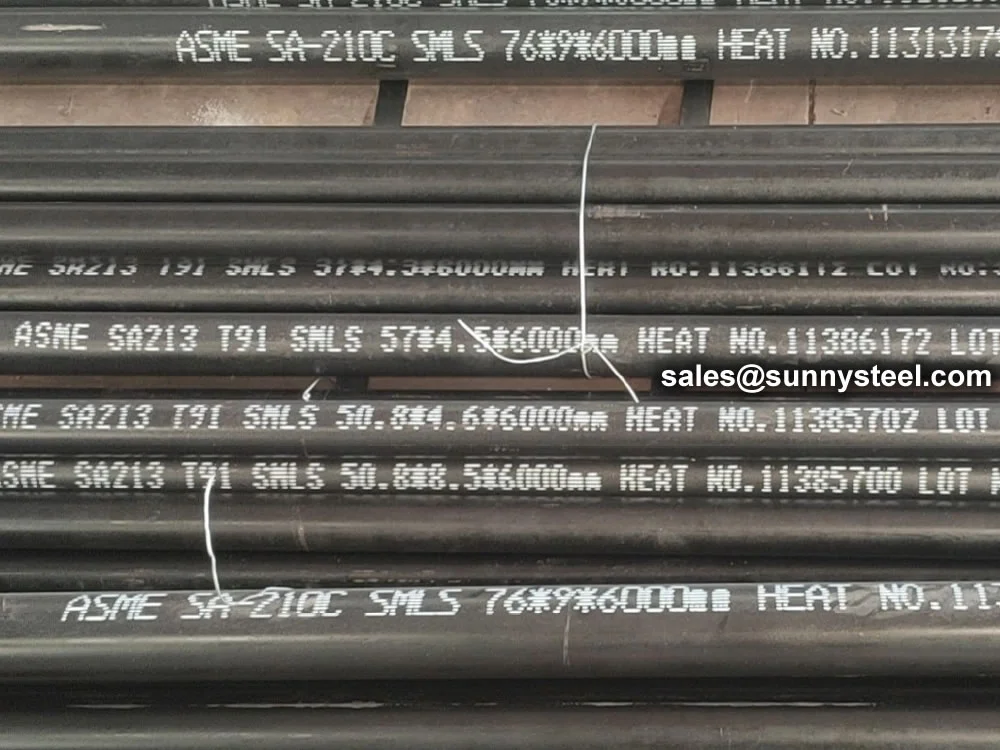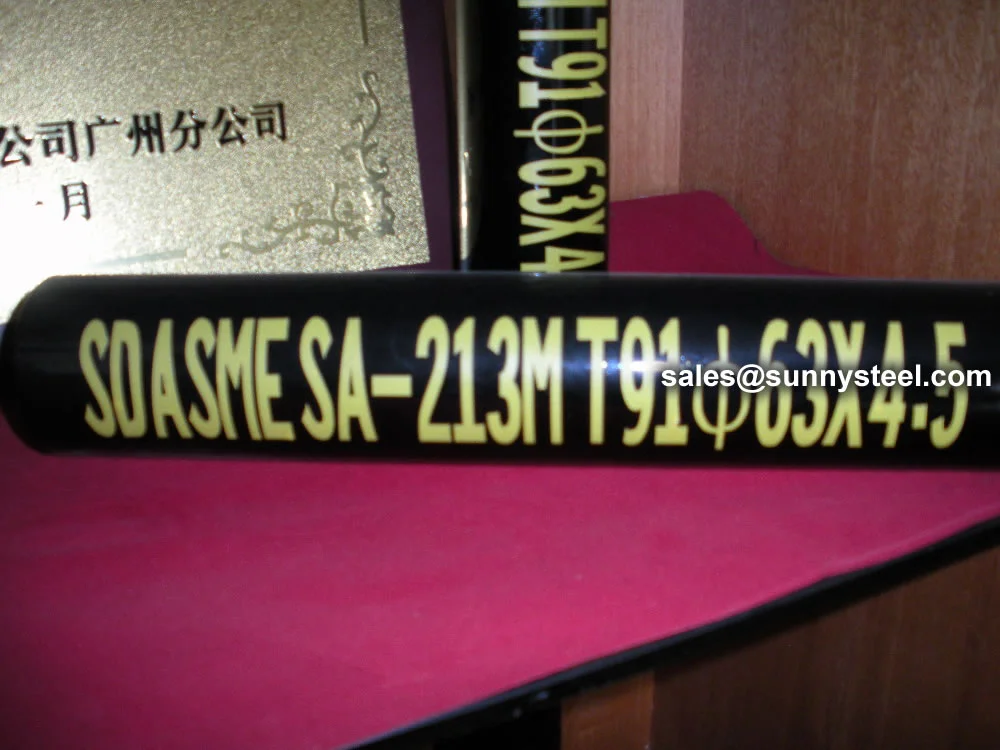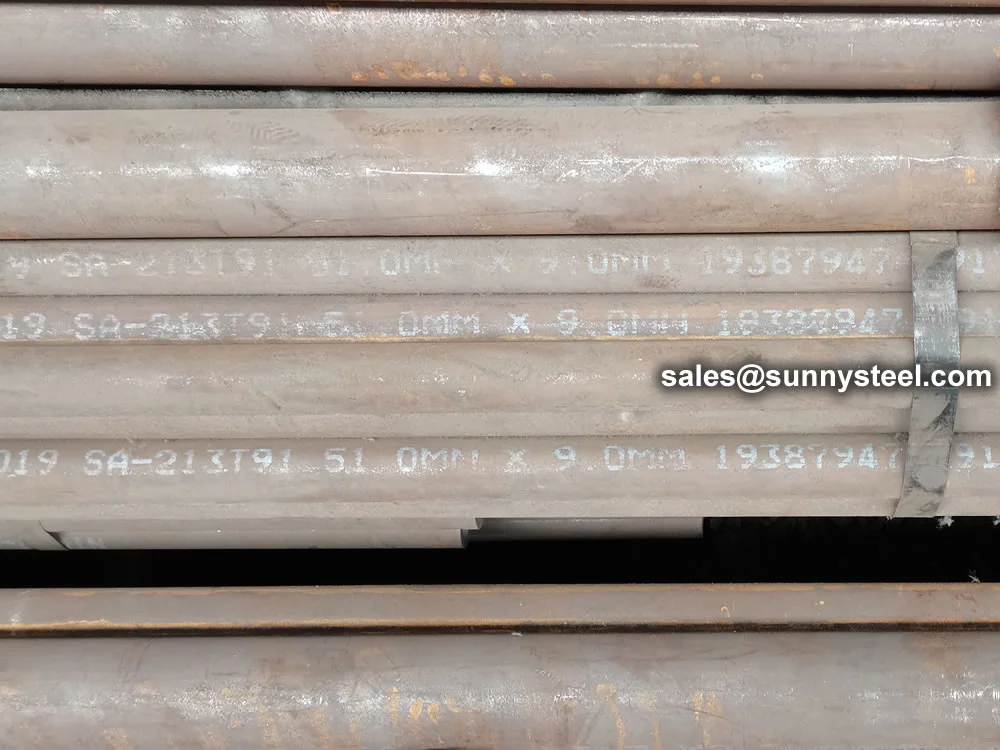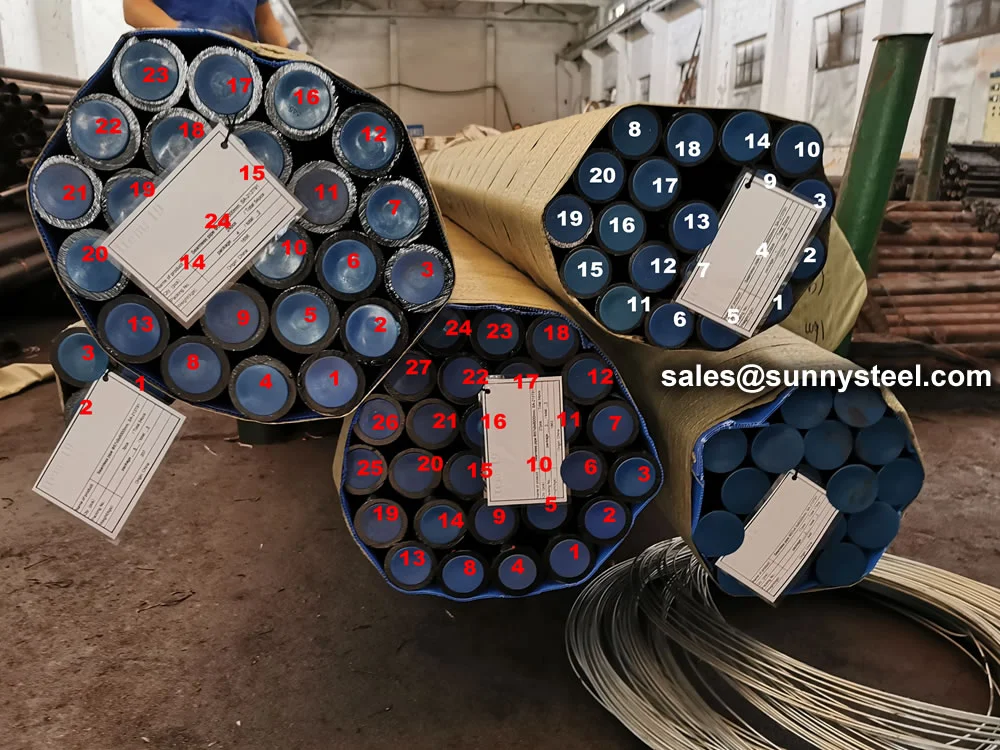
High-temperature Applications
Astm a213 gr t91 seamless alloy steel tubing offers superior creep strength and corrosion resistance, designed for high-temperature applications in supercritical and ultra-supercritical boilers, superheaters, and heat exchangers in power plants and petrochemical industries.
High-temperature Applications
Astm a213 gr t91 seamless alloy steel tubing offers superior creep strength and corrosion resistance, designed for high-temperature applications in supercritical and ultra-supercritical boilers, superheaters, and heat exchangers in power plants and petrochemical industries.
ASTM A213 Gr T91 Seamless Alloy Steel Tubing (also ASME SA213 T91, UNS K90901) is an advanced ferritic alloy steel tubing engineered for high-temperature and high-pressure service in supercritical and ultra-supercritical boilers. Conforming to the ASTM A213/ASME SA213 specification, these Chrome Moly Tubes contain 8.00-9.50% chromium, 0.85-1.05% molybdenum, and alloying elements like vanadium and niobium, making them ideal for boiler tubes, superheaters, and heat exchangers in power generation and petrochemical industries.
The ASTM A213 Gr T91 Seamless Alloy Steel Tubing is manufactured through seamless hot-rolling or cold-drawing processes, followed by heat treatment (normalizing at 1040-1080°C, tempering at 730-780°C) to achieve a martensitic microstructure for superior creep strength. The high chromium content provides excellent oxidation and corrosion resistance, while molybdenum, vanadium, and niobium enhance creep resistance and high-temperature strength (up to 650°C). These tubes are suitable for bending, flanging, and welding, with recommended preheating (200-250°C) and post-weld heat treatment (PWHT at 730-780°C) to ensure weld integrity. Available in sizes from 1/8” to 5” (3.2 mm to 127 mm) OD, with wall thicknesses from 0.015” to 0.500” (0.4 mm to 12.7 mm), and lengths up to 40ft or customized, they meet rigorous project requirements.
The Seamless Alloy Steel Tubing undergoes stringent testing, including tensile, hardness, flattening, flaring, and hydrostatic or nondestructive electric tests, to ensure compliance with ASTM A213 standards. With a minimum tensile strength of 585 MPa, yield strength of 415 MPa, and elongation of 20% (longitudinal), these tubes deliver robust performance in extreme environments. Their corrosion resistance suits petrochemical applications, while their creep strength supports ultra-supercritical boiler systems. Surface treatments like pickling, bright annealing, or anti-corrosion coatings enhance durability, and plain or beveled ends facilitate installation.
Compared to grades like T9 or T92, the ASTM A213 Gr T91 Seamless Alloy Steel Tubing offers an optimal balance of high strength and creep resistance, making it a preferred choice for advanced power generation systems. Its compatibility with ASTM A234 WP91 fittings ensures seamless integration into complex tubing systems.
T91 has higher chromium (8.0–9.5% vs. 1.0–1.5%), higher molybdenum (0.85–1.05% vs. 0.44–0.65%), and includes vanadium and niobium for superior creep strength. T91 supports higher temperatures (up to 650°C vs. 560°C) and has higher strength (585/415 MPa vs. 415/205 MPa).
T91 has higher chromium (8.0–9.5% vs. 0.8–1.25%), higher molybdenum (0.85–1.05% vs. 0.44–0.65%), and includes vanadium and niobium, offering better corrosion and creep resistance. T91 is suited for ultra-supercritical boilers (up to 650°C vs. 550°C) with higher strength (585/415 MPa vs. 415/220 MPa).
T91 has higher chromium (8.0–9.5% vs. 1.9–2.6%) and similar molybdenum (0.85–1.05% vs. 0.87–1.13%) but includes vanadium and niobium for enhanced creep resistance. T91 supports higher temperatures (650°C vs. 593°C) and has higher strength (585/415 MPa vs. 415/205 MPa).
T91 has similar chromium (8.0–9.5% vs. 8.0–10.0%) and molybdenum (0.85–1.05% vs. 0.9–1.1%) but includes vanadium and niobium for superior creep resistance. T91 has higher strength (585/415 MPa vs. 415/205 MPa) and is suited for ultra-supercritical boilers (up to 650°C vs. 620°C).
T92 is an enhanced version of T91, with added tungsten (1.5–2.0%) and boron (0.001–0.006%) for improved creep strength, but similar chromium (8.5–9.5% vs. 8.0–9.5%) and slightly higher strength (620/440 MPa vs. 585/415 MPa). Both are used in ultra-supercritical boilers (up to 650°C).
T91 has higher chromium (8.0–9.5% vs. 2.2–2.6%) but similar vanadium and niobium, while T24 includes titanium and boron. T91 is suited for ultra-supercritical boilers (up to 650°C vs. 600°C) with similar strength (585/415 MPa).
T91 (ASTM A213) is a seamless tube for heat transfer components (thinner walls, OD 1/8” to 5”), while P91 (ASTM A335) is a pipe for structural and pressure piping (OD 1/8” to 48”). Both share the same 9Cr–1Mo–V–Nb chemistry but are used in different applications.
The ASTM A213 Gr T91 Seamless Alloy Steel Tubing addresses critical challenges like corrosion, creep, and thermal stress in high-throughput industrial systems. Its advanced chrome-moly alloy composition and seamless construction make it a premium choice for engineers seeking durable boiler tubes and heat exchanger tubes for extreme environments.
Dimensions and performance data for ASTM A213 Gr T91 Seamless Alloy Steel Tubing
| Element | Composition (%) |
|---|---|
| Carbon (C) | 0.08-0.12 |
| Manganese (Mn) | 0.30-0.60 |
| Phosphorus (P) | ≤0.020 |
| Sulfur (S) | ≤0.010 |
| Silicon (Si) | 0.20-0.50 |
| Chromium (Cr) | 8.00-9.50 |
| Molybdenum (Mo) | 0.85-1.05 |
| Vanadium (V) | 0.18-0.25 |
| Nitrogen (N) | 0.03-0.07 |
| Property | Value |
|---|---|
| Tensile Strength, min (MPa) | 585 |
| Yield Strength, min (MPa) | 415 |
| Elongation, min (%) | 20 (Longitudinal) |
| Hardness, max (HB) | 217 |
| Parameter | Range | Standard |
|---|---|---|
| Inside Diameter | 1/8" to 5" | 3.2 mm to 127 mm |
| Wall Thickness | 0.015" to 0.500" | 0.4 mm to 12.7 mm |
| Length | 5–7 m / 9–13 m | SRL / DRL |
| Schedule | 40 to 160 | STD, XS, XXS |
| Property | Value | Unit |
|---|---|---|
| Max Service Temperature | 650 | °C |
| Tensile Strength | 415–690 | MPa |
| Yield Strength | 205–520 | MPa |
| Elongation | 20–30 | % |
Key advantages that make ASTM A213 alloy tubes a preferred choice in high-temperature and corrosive environments.
Maintains structural integrity under extreme heat, ideal for boilers, heat exchangers, and superheaters.
Chromium and molybdenum ensure excellent resistance to oxidation and chemical attack in aggressive media.
Offers high tensile and yield strength, ensuring safe performance under high pressure and temperature.
Durable construction and corrosion resistance extend operational life and minimize maintenance downtime.
Precision manufacturing ensures uniform wall thickness and surface finish, optimizing heat transfer and fit.
Widely used in power generation, petrochemical, and thermal processing industries due to its performance and reliability.

ASTM A213 Gr T91 Seamless Alloy Steel Tubing are widely used in various industries due to their excellent high-temperature and high-pressure performance.
Utilized in boilers, superheaters, and reheaters within steam power plants due to their high-temperature resistance and durability.
Employed in refineries and chemical plants for transporting high-temperature fluids and gases, ensuring safety and efficiency.
Ideal for use in heat exchangers where thermal stability and corrosion resistance are critical under fluctuating temperatures.
Commonly used in high-pressure boilers and superheaters, offering excellent performance under extreme thermal conditions.
Applied in the extraction and processing of oil and gas, handling high-pressure and high-temperature fluids effectively.
Suitable for equipment in chemical industries where resistance to corrosive substances and high temperatures is essential.

Astm a213 t91 alloy steel boiler tubes offer high ...

Sa213 t91 boiler tubes are seamless alloy steel tu...

Astm a213 t91 seamless alloy tubes offer superior ...